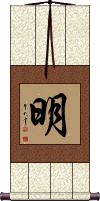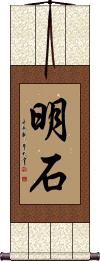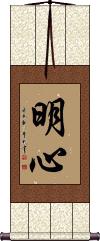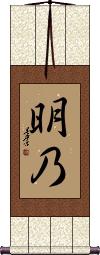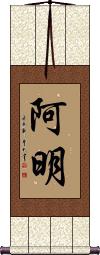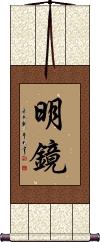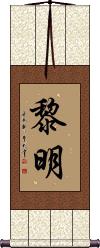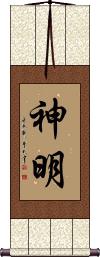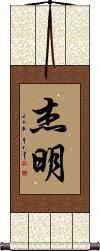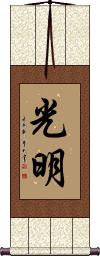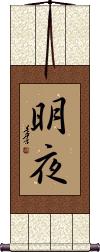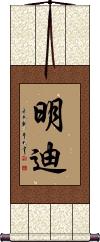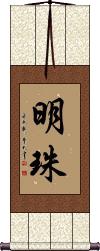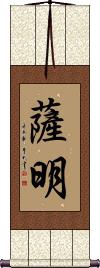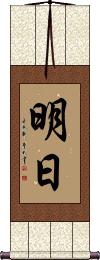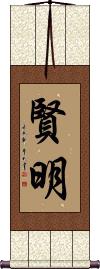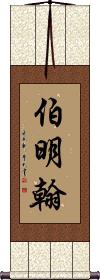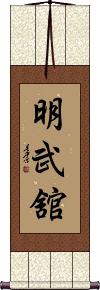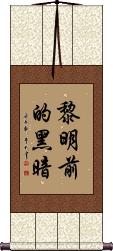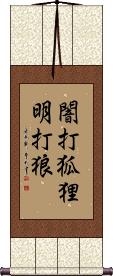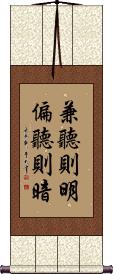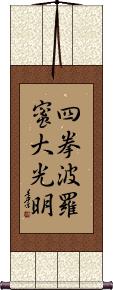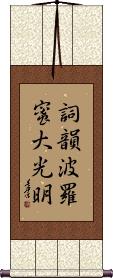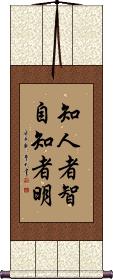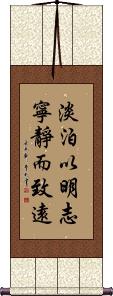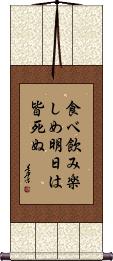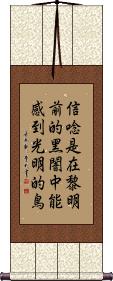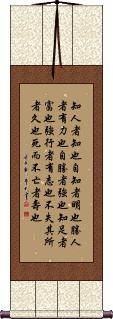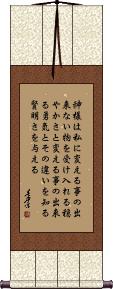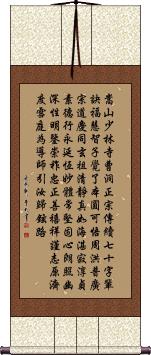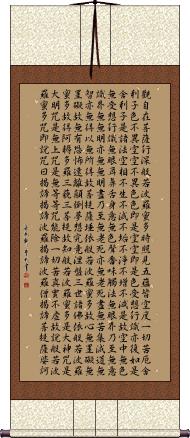Many custom options...
And formats...

明 in Chinese / Japanese...
Buy an 明 calligraphy wall scroll here!
Personalize your custom “明” project by clicking the button next to your favorite “明” title below...
2. Minh
3. Akashi
4. Akemi
5. Akeno
6. Amin
7. Amine
8. Armin
10. Dawn / Early Morning / Twilight
11. Deities / Gods
12. Jamin
13. Light / Bright and Promising Future
14. Meiya
15. Mindee
16. Bright Pearl
17. Samin
20. Benjamim
21. Benjamin
22. Birmingham
23. Great Illumination of Wisdom
24. Domingo
25. Fermin
26. Meibukan
28. Remington
29. Domingas
30. Domingos
31. Dominguez
34. Bright and Promising Future
36. The Night is Darkest Before the Dawn
37. Hunt Foxes with Stealth, Hunt Wolves in the Open
38. Listen to Both Sides and be Enlightened, Listen to One Side and be in the Dark
41. Those Who Understand are Clever, Those Who Know Themselves are Truly Wise
42. A Life of Serenity Yields Understanding
43. Eat Drink and Be Merry, For Tomorrow We Die
44. Faith is the bird that feels the light when the dawn is still dark
45. Daodejing / Tao Te Ching - Chapter 33
46. Serenity Prayer
48. Heart Sutra
Light / Bright
明 means light, bright, clear, clarity, to understand, or wise.
In Chinese, this can refer to the Ming Dynasty (1368-1644) where it can also be the surname Ming.
In Japanese, this can be romanized many different ways when used as surnames or given names. 明 is a partial list of those names: Meishuu, Mei, Min, Myoujin, Myou, Hinata, Haru, Toshi, Tooru, Sayaka, Saya, Satoshi, Asumi, Akera, Akemine, Akesaki, Ake, Akuru, Akiraka, and Akira.
In the Buddhist context, this represents vidyā (knowledge). To expand that, Buddhists understand this to mean bright, clear, enlightenment, wisdom, or to understand. It represents Buddha-wisdom and its revelation; also the manifestation of a Buddha's light or effulgence.
Minh
Akashi
Akemi
Akeno
Amin
Amine
Armin
Mirror: Beautiful Clarity
While 明鏡 means mirror in Chinese, Japanese Kanji, and old Korean Hanja, it's commonly used as a metaphor for something beautiful and bright or something that provides clarity and insight.
Dawn / Early Morning / Twilight
黎明 is the word that means dawn, early morning, or daybreak in Chinese, Japanese Kanji, and old Korean Hanja.
Deities / Gods
In Chinese, Japanese Kanji, and old Korean Hanja, 神明 title refers to deities or gods (can be the singular or plural form).
Depending on the context, this could also mean “divine.”
Specifically, in Japanese, this can refer to Amaterasu (as an enshrined deity).
In some Buddhist contexts, this also means deity but can also refer to “intelligence” (as in all-knowing).
Jamin
Light / Bright and Promising Future
光明 is a nice way to say “light” in Chinese and old Korean Hanja.
This is because the word also suggests a bright future or refers to someone who is very promising (great future potential).
The first character means light or bright.
The second character means bright and clear (in this context).
This word appears in most Japanese dictionaries, but it is not the most common Japanese Kanji word for light (more commonly used for the name Mitsuharu).
In old Korean Hanja, this can also mean brightness or brilliance.
In the context of Buddhism, this means “Light emanating from a Buddha or Bodhisattva, symbolizing their wisdom and compassion.”
Meiya
Mindee
Bright Pearl
This means bright pearl or jewel of great value.
明珠 is a female given name Mingzhu in Chinese or Meishu in Japanese.
Samin
Tomorrow / The Next Sun
Wisdom / Intelligence
賢明 is a Japanese word that refers to wisdom, intelligence, and prudence.
賢明 was originally a Chinese word that referred to a wise person or enlightened ruler. It means wise and able, sagacious now in China.
Benjamim
Benjamin
Benjamin
Birmingham
Great Illumination of Wisdom
Domingo
Fermin
Meibukan
Reiki - Master Symbol
大光明 is the master symbol “Daikomyo” or “Dai Ko Myo,” which is usually associated with the healing practice of Reiki.
This title can be translated as “Great Bright Light.” This symbol, as used in Reiki, alludes to “Enlightened Nature” or the radiance of a purified soul or deity.
Pronunciations in Chinese and Korean are included above but this title has no meaning except when used by a Reiki practitioner. In fact, this title is not that well known by those outside the Reiki community in Japan.
In Chinese, this would be interpreted as “Great Bright Future” (the second two characters alone create a word that means “bright future” in Chinese).
Remington
Domingas
Domingos
Dominguez
Fudo Myo-o / Wisdom King
不動明王 is the fierce form of the Buddha Vairocana, and the most important of the Myō-ō or Ming Wang class of deities.
Romanized as Fudō Myō-ō, in Japanese Buddhism or Bùdòng Míngwáng / Pu-Tung Ming-Wang in Chinese Buddhism,
Originally Acala/Achala (अचल “The Immovable”), Acalanātha (अचलनाथ “Immovable Lord”) or Āryācalanātha (आर्याचलनाथ, “Noble Immovable Lord”).
In English, this deity is sometimes called “Wisdom King.”
Pearl in the Palm
Bright and Promising Future
明るい未来 is a Japanese proverb that means “Bright Future.”
It suggests a lot of possibilities and potential awaits in your future. A great gift for a graduate.
The first part of this proverb literally means bright or light. The second part means the future but can also be translated as “the world to come.”
Note: Because this selection contains some special Japanese Hiragana characters, it should be written by a Japanese calligrapher.
Meifu Shinkage-Ryu
The Night is Darkest Before the Dawn
黎明前的黑暗 is the most natural way to write “The night is darkest before the dawn,” in Chinese.
The words break down this way by meaning this way:
1.黎明 dawn or daybreak
2.前 before, in front, ago, former, previous, and/or earlier
3.的 (possessive particle) of
4.黑暗 dark, darkly, or darkness
If you try to understand the Chinese word order and grammar, it's like, “Before dawn is the darkest [time].”
Hunt Foxes with Stealth, Hunt Wolves in the Open
闇打狐狸明打狼 is a Chinese proverb that translates as: Hunt foxes stealthily, [and] hunt wolves openly [just as they do].
Figuratively, this means:
Different opponents require different appropriate strategies.
This is a suggestion that you should know your enemy and know that each enemy is different, therefore requires a specialized approach (attack).
Listen to Both Sides and be Enlightened, Listen to One Side and be in the Dark
兼聽則明偏聽則暗 is an ancient Chinese proverb about getting all the information from all sides so that you truly understand a situation.
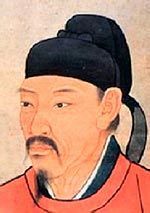
Wei Zheng
A man named Wei Zheng lived between 580-643 AD. He was a noble and wise historian and minister in the court of the early Tang Dynasty. The emperor once asked him, “What should an emperor do to understand the real-world situation, and what makes an emperor out-of-touch with reality?”
Wei Zheng replied, “Listen to both sides and you will be enlightened; listen to only one side and you will be left in the dark.”
Then Wei Zheng went on to cite examples of leaders in history that were victorious after heeding both sides of the story, and other leaders that met their doom because they believed one-sided stories which often came from flattering lips.
Please note that there is an unwritten rule when the same character appears twice in the same phrase, the calligrapher will alter the appearance so that no two characters are exactly alike in the same piece. This calligraphy has two repeating characters that will be written differently than they appear here.
Shiken Haramitsu Daikomyo
四拳波羅蜜大光明 is “shiken haramitsu daikōmyō,” a famous Japanese Buddhist mantra.
四拳 = shi-ken = four fists (many translate this as “four hearts”).
波羅蜜 = ha-ra-mitsu = A loanword representing pāramitā, or entrance into Nirvana. Awkwardly, it also means jackfruit.
大光明 = dai-kou-myo = big/great light bright (great bright light).
Shiken represents four hearts:
1. The Merciful Heart - Love and caring for all living things.
2. The Sincere Heart - Pursues righteousness, or the right path - sincerely trying to do what is right.
3. The Attuned Heart - Knows that nature and fate have their ways, and thus stay in tune with the universe.
4. The Dedicated Heart - Steadfast on the chosen path to the end.
Shikin Haramitsu Daikomyo
詞韻波羅蜜大光明 are the Japanese Kanji characters that romanize as “Shikin Haramitsu Daikōmyō.”
This is a complicated proverb. I'm actually going to forgo writing any translation information here. You can figure it out via Google search and at sites like Paramita and the Perfection of Wisdom or
Fecastel.Wordpress.com::Shikin Haramitsu Daikōmyō
Those Who Understand are Clever, Those Who Know Themselves are Truly Wise
A Life of Serenity Yields Understanding
淡泊以明志寧靜而致遠 is a kind of complex ten-character proverb composed by Zhuge Liang about 1800 years ago.
This is a Chinese proverb that means “Leading a simple life will yield a clear mind, and having inner peace will help you see far (into the world).”
What I have translated as “simple life” means NOT being materialistic and NOT competing in the rat race.
The last word means “far” but the deeper meaning is that you will surpass what you can currently see or understand. Perhaps even the idea of opening up vast knowledge and understanding of complex ideas.
The whole phrase has a theme that suggests if you are NOT an aggressive cut-throat person who fights his way to the top no matter how many people he crushes on the way, and instead seek inner peace, you will have a happier existence and be more likely to understand the meaning of life.
Eat Drink and Be Merry, For Tomorrow We Die
Faith is the bird that feels the light when the dawn is still dark
信唸是在黎明前的黑闇中能感到光明的鳥 is a philosophical poem/quote from Indian Poet and Philosopher, Rabindranath Tagore.

Rabindranath Tagore, 1915
This quote is not sourced, and therefore several variations exist in English. Some suggest the original was in the Bengali language.
This, of course, is the Chinese translation that has the meaning of, “Faith is the bird that feels the light and sings when the dawn is still dark.”
More about Rabindranath Tagore
Daodejing / Tao Te Ching - Chapter 33
This is referred to as passage or chapter 33 of the Dao De Jing (often Romanized as “Tao Te Ching”).
These are the words of the philosopher Laozi (Lao Tzu).
To know others is wisdom;
To know oneself is acuity/intelligence.
To conquer others is power,
To conquer oneself is strength.
To know contentment is to have wealth.
To act resolutely is to have purpose.
To stay one's ground is to be enduring.
To die and yet not be forgotten is to be long-lived.
To understand others is to be knowledgeable;
To understand yourself is to be wise.
To conquer others is to have strength;
To conquer yourself is to be strong.
To know when you have enough is to be rich.
To go forward with strength is to have ambition.
To not lose your place is to be long-lasting.
To die but not be forgotten -- that's true long life.
He who is content is rich;
He who acts with persistence has will;
He who does not lose his roots will endure;
He who dies physically but preserves the Dao
will enjoy a long after-life.
Notes:
During our research, the Chinese characters shown here are probably the most accurate to the original text of Laozi. These were taken for the most part from the Mawangdui 1973 and Guodan 1993 manuscripts which pre-date other Daodejing texts by about 1000 years.
Grammar was a little different in Laozi’s time. So you should consider this to be the ancient Chinese version. Some have modernized this passage by adding, removing, or swapping articles and changing the grammar (we felt the oldest and most original version would be more desirable). You may find other versions printed in books or online - sometimes these modern texts are simply used to explain to Chinese people what the original text really means.
This language issue can be compared in English by thinking how the King James (known as the Authorized version in Great Britain) Bible from 1611 was written, and comparing it to modern English. Now imagine that the Daodejing was probably written around 403 BCE (2000 years before the King James Version of the Bible). To a Chinese person, the original Daodejing reads like text that is 3 times more detached compared to Shakespeare’s English is to our modern-day speech.
Extended notes:
While on this Biblical text comparison, it should be noted, that just like the Bible, all the original texts of the Daodejing were lost or destroyed long ago. Just as with the scripture used to create the Bible, various manuscripts exist, many with variations or copyist errors. Just as the earliest New Testament scripture (incomplete) is from 170 years after Christ, the earliest Daodejing manuscript (incomplete) is from 100-200 years after the death of Laozi.
The reason that the originals were lost probably has a lot to do with the first Qin Emperor. Upon taking power and unifying China, he ordered the burning and destruction of all books (scrolls/rolls) except those pertaining to Chinese medicine and a few other subjects. The surviving Daodejing manuscripts were either hidden on purpose or simply forgotten about. Some were not unearthed until as late as 1993.
We compared a lot of research by various archeologists and historians before deciding on this as the most accurate and correct version. But one must allow that it may not be perfect, or the actual and original as from the hand of Laozi himself.
Serenity Prayer
This is a Japanese version of the serenity prayer, as used by many 12-step programs and support groups.
In Japanese, this says:
God grant me the serenity to accept the things I cannot change, the courage to change the things I can, and the wisdom to know the difference.
Note: Because this selection contains some special Japanese Hiragana characters, it should be written by a Japanese calligrapher.
Shaolin Generational Poem
This is a poem, including a title, that celebrates the tactics and virtues of the Shaolin Kung Fu Monks for future generations.
Heart Sutra
This is the Heart Sutra in Chinese as translated by Xuanzang.
The Heart Sutra is often cited as the best-known and most popular of all Buddhist scriptures.
Notes: There are too many characters for this to be done by the economy calligrapher. You must choose a Master Calligrapher.
With this many characters, and the fact that one tiny mistake wipes out hours of work, keep in mind that writing the Heart Sutra is usually a full day of work for a calligrapher. This work and personal energy should be cherished and respected. In other words, the calligrapher is not charging enough money for the value that you are getting here.
Also, you will find that as my server processes 260 characters, the customization process is a bit slow for this title.
Not the results for 明 that you were looking for?
Below are some entries from our dictionary that may match your 明 search...
| Characters If shown, 2nd row is Simp. Chinese |
Pronunciation Romanization |
Simple Dictionary Definition |
明 see styles |
míng ming2 ming mei / me めい |
More info & calligraphy: Light / Bright(1) (ant: 暗) brightness; (2) discernment; insight; an eye (for); (3) (See 明を失う) eyesight; vision; (prefix) (4) (abbreviation) (See 明治) nth year in the Meiji era (1868.9.8-1912.7.30); (surname) Meishuu vidyā, knowledge. ming means bright, clear, enlightenment, intp. by 智慧 or 聰明 wisdom, wise; to understand. It represents Buddha-wisdom and its revelation; also the manifestation of a Buddha's light or effulgence; it is a term for 眞言 because the 'true word' can destroy the obscurity of illusion; the 'manifestation' of the power of the object of worship; it means also dhāraṇīs or mantras of mystic wisdom. Also, the Ming dynasty A. D. 1368-1644. |
光明 see styles |
guāng míng guang1 ming2 kuang ming koumyou(p); koumei / komyo(p); kome こうみょう(P); こうめい |
More info & calligraphy: Light / Bright and Promising Future(1) bright light; (2) hope; bright future; (3) {Buddh} light emanating from a buddha or bodhisattva, symbolizing their wisdom and compassion; (place-name) Gwangmyeong (South Korea) v. last entry. |
明乃 see styles |
haruno はるの |
More info & calligraphy: Akeno |
明夜 see styles |
myouya / myoya みょうや |
More info & calligraphy: Meiya |
明心 see styles |
míng xīn ming2 xin1 ming hsin meimi / memi めいみ |
More info & calligraphy: AkemiThe enlightened heart. |
明日 see styles |
míng rì ming2 ri4 ming jih ashita(gikun)(p); asu(gikun)(p); myounichi(p) / ashita(gikun)(p); asu(gikun)(p); myonichi(p) あした(gikun)(P); あす(gikun)(P); みょうにち(P) |
More info & calligraphy: Tomorrow / The Next Sun(n,adv) (1) tomorrow; (n,adv) (2) (あす only) near future; (female given name) Meibi tomorrow |
明珠 see styles |
míng zhū ming2 zhu1 ming chu meishu / meshu めいしゅ |
More info & calligraphy: Bright Pearl(given name) Meishu bright pearl |
明石 see styles |
meiseki / meseki めいせき |
More info & calligraphy: Akashi |
明迪 see styles |
harumichi はるみち |
More info & calligraphy: Mindee |
明鏡 明镜 see styles |
míng jìng ming2 jing4 ming ching meikyou; myoukyou; meikei / mekyo; myokyo; meke めいきょう; みょうきょう; めいけい |
More info & calligraphy: Mirror: Beautiful Claritypolished mirror; clear mirror; (personal name) Meikyō a [clear] mirror |
神明 see styles |
shén míng shen2 ming2 shen ming shinmei / shinme しんめい |
More info & calligraphy: Deities / Gods(1) deity; god; (2) (See 天照大神) Amaterasu (as an enshrined deity); (surname) Jinmei The spirits of heaven and earth, the gods; also the intelligent or spiritual nature. |
賢明 贤明 see styles |
xián míng xian2 ming2 hsien ming kenmei / kenme けんめい |
More info & calligraphy: Wisdom / Intelligence(noun or adjectival noun) wise; sensible; well-advised; intelligent; sagacious; prudent; (given name) Yoshimitsu wise |
阿明 see styles |
ā míng a1 ming2 a ming |
More info & calligraphy: Armin |
黎明 see styles |
lí míng li2 ming2 li ming reimei / reme れいめい |
More info & calligraphy: Dawn / Early Morning / Twilight(1) daybreak; dawn; gray of the morning (grey); (2) dawn (of a new age); (female given name) Reimei |
伯明翰 see styles |
bó míng hàn bo2 ming2 han4 po ming han |
More info & calligraphy: Birmingham |
大光明 see styles |
dà guāng míng da4 guang1 ming2 ta kuang ming oomiya おおみや |
More info & calligraphy: Reiki - Master Symbol |
不動明王 不动明王 see styles |
bù dòng míng wáng bu4 dong4 ming2 wang2 pu tung ming wang fudoumyouou / fudomyoo ふどうみょうおう |
More info & calligraphy: Fudo Myo-o / Wisdom King不動尊 Aryacalanatha 阿奢羅曩 tr. 不動尊 and 無動尊 and Acalaceta, 阿奢囉逝吒 tr. 不動使者. The mouthpiece or messenger, e. g. the Mercury, of the Buddhas; and the chief of the five Ming Wang. He is regarded as the third person in the Vairocana trinity. He has a fierce mien overawing all evil spirits. He is said to have attained to Buddhahood, but also still to retain his position with Vairocana. He has many descriptive titles, e. g. 無量力神通無動者; 不動忿怒王, etc. Five different verbal signs are given to him. He carries a sharp wisdom-sword, a noose, a thunder-bolt. The colour of his images is various—black, blue, purple. He has a youthful appearance; his hair falls over his left shoulder; he stands or sits on a rock; left eye closed; mouth shut, teeth gripping upper lip, wrinkled forehead, seven locks of hair, full-bodied, A second representation is with four faces and four arms, angry mien, protruding teeth, with fames around him. A third with necklaces. A fourth, red, seated on a rock, fames, trident, etc. There are other forms. He has fourteen distinguishing symbols, and many dharanis associated with the realm of fire, of saving those in distress, and of wisdom. He has two messengers 二童子 Kimkara 矜羯羅 and Cetaka 制吒迦, and, including these, a group of eight messengers 八大童子 each with image, symbol, word-sign, etc. Cf. 不動佛. |
掌上明珠 see styles |
zhǎng shàng míng zhū zhang3 shang4 ming2 zhu1 chang shang ming chu |
More info & calligraphy: Pearl in the Palm |
黎明前的黑暗 see styles |
lí míng qián de hēi àn li2 ming2 qian2 de5 hei1 an4 li ming ch`ien te hei an li ming chien te hei an |
More info & calligraphy: The Night is Darkest Before the Dawn |
一明 see styles |
yī míng yi1 ming2 i ming kuniharu くにはる |
(given name) Kuniharu ming (i.e. bright, clear, illuminating) is the Shingon word for a dhāraṇī, or magical formula; especially applied to a magical acts. |
七明 see styles |
nanami ななみ |
(female given name) Nanami |
丈明 see styles |
takeaki たけあき |
(given name) Takeaki |
三明 see styles |
sān míng san1 ming2 san ming sanmyou / sanmyo さんみょう |
Sanming, prefecture-level city in Fujian {Buddh} (See 宿命通,天眼通,漏尽通) three kinds of awareness; (surname, given name) Mitsuaki The three insights; also 三達. Applied to Buddhas they are called 三達, to arhats 三明. (a) 宿命明 Insight into the mortal conditions of self and others in previous lives; (b) 天眼明 supernatural insight into future mortal conditions; (c) 漏盡明 nirvāṇa insight, i.e. into present mortal sufferings so as to overcome aIl passions or temptations. In the 倶舍論 27 the three are termed 住智識證明; 死生識證明 and 漏盡識證明. For 三明經 v. 長阿含16. |
上明 see styles |
joumei / jome じょうめい |
(given name) Jōmei |
下明 see styles |
shitamyou / shitamyo したみょう |
(place-name) Shitamyou |
不明 see styles |
bù míng bu4 ming2 pu ming fumei / fume ふめい |
not clear; unknown; to fail to understand (noun or adjectival noun) (1) unclear; obscure; indistinct; uncertain; ambiguous; (adj-no,suf) (2) unknown; unidentified; (3) ignorance; lack of wisdom; lack of insight; (female given name) Fumi unclear |
与明 see styles |
yoshiaki よしあき |
(male given name) Yoshiaki |
世明 see styles |
seimei / seme せいめい |
(personal name) Seimei |
丞明 see styles |
sukemasa すけまさ |
(personal name) Sukemasa |
中明 see styles |
nakaaki / nakaki なかあき |
(surname) Nakaaki |
Click here for more 明 results from our dictionary
The following table may be helpful for those studying Chinese or Japanese...
| Title | Characters | Romaji (Romanized Japanese) | Various forms of Romanized Chinese | |
| Light Bright | 明 | mei / myou / mei / myo | míng / ming2 / ming | |
| Minh | 明 | míng / ming2 / ming | ||
| Akashi | 明石 | akashi | míng shí ming2 shi2 ming shi mingshi | ming |
| Akemi | 明心 | akemi | míng xīn / ming2 xin1 / ming xin / mingxin | ming hsin / minghsin |
| Akeno | 明乃 | akeno | ||
| Amin | 阿明 | ā míng / a1 ming2 / a ming / aming | ||
| Amine | 阿明 | ā míng / a1 ming2 / a ming / aming | ||
| Armin | 阿明 | ā míng / a1 ming2 / a ming / aming | ||
| Mirror: Beautiful Clarity | 明鏡 明镜 | mei kyou / meikyou / mei kyo | míng jìng ming2 jing4 ming jing mingjing | ming ching mingching |
| Dawn Early Morning Twilight | 黎明 | rei mei / reimei | lí míng / li2 ming2 / li ming / liming | |
| Deities Gods | 神明 | jin myou / jinmyou / jin myo | shén míng shen2 ming2 shen ming shenming | |
| Jamin | 杰明 | jié míng / jie2 ming2 / jie ming / jieming | chieh ming / chiehming | |
| Light Bright and Promising Future | 光明 | kou mei / mitsu haru koumei / mitsuharu ko mei / mitsu haru | guāng míng guang1 ming2 guang ming guangming | kuang ming kuangming |
| Meiya | 明夜 | mei ya / meiya | ||
| Mindee | 明迪 | míng dí / ming2 di2 / ming di / mingdi | ming ti / mingti | |
| Bright Pearl | 明珠 | mei shu / meishu | míng zhū / ming2 zhu1 / ming zhu / mingzhu | ming chu / mingchu |
| Samin | 薩明 萨明 | sà míng / sa4 ming2 / sa ming / saming | ||
| Tomorrow The Next Sun | 明日 | ashita / meibi | míng rì / ming2 ri4 / ming ri / mingri | ming jih / mingjih |
| Wisdom Intelligence | 賢明 贤明 | ken mei / kenmei | xián míng xian2 ming2 xian ming xianming | hsien ming hsienming |
| Benjamim | 本杰明 | běn jié míng ben3 jie2 ming2 ben jie ming benjieming | pen chieh ming penchiehming |
|
| Benjamin | 本杰明 | běn jié míng ben3 jie2 ming2 ben jie ming benjieming | pen chieh ming penchiehming |
|
| Benjamin | 本沙明 | běn shā míng ben3 sha1 ming2 ben sha ming benshaming | pen sha ming penshaming |
|
| Birmingham | 伯明翰 | bó míng hàn bo2 ming2 han4 bo ming han bominghan | po ming han pominghan |
|
| Great Illumination of Wisdom | 大智明 | dai chi myou daichimyou dai chi myo | dà zhì míng da4 zhi4 ming2 da zhi ming dazhiming | ta chih ming tachihming |
| Domingo | 多明戈 | duō míng gē duo1 ming2 ge1 duo ming ge duomingge | to ming ko tomingko |
|
| Fermin | 費爾明 费尔明 | fèi ěr míng fei4 er3 ming2 fei er ming feierming | fei erh ming feierhming |
|
| Meibukan | 明武舘 | mei bu kan / meibukan | ||
| Reiki - Master Symbol | 大光明 | dai kou myou daikoumyou dai ko myo | dà guāng míng da4 guang1 ming2 da guang ming daguangming | ta kuang ming takuangming |
| Remington | 雷明頓 雷明顿 | léi míng dùn lei2 ming2 dun4 lei ming dun leimingdun | lei ming tun leimingtun |
|
| Domingas | 多明加斯 | duō míng jiā sī duo1 ming2 jia1 si1 duo ming jia si duomingjiasi | to ming chia ssu tomingchiassu |
|
| Domingos | 多明戈斯 | duō míng gē sī duo1 ming2 ge1 si1 duo ming ge si duominggesi | to ming ko ssu tomingkossu |
|
| Dominguez | 多明格斯 | duō míng gé sī duo1 ming2 ge2 si1 duo ming ge si duominggesi | to ming ko ssu tomingkossu |
|
| Fudo Myo-o Wisdom King | 不動明王 不动明王 | fu dou myou ou fudoumyouou fu do myo o | bù dòng míng wáng bu4 dong4 ming2 wang2 bu dong ming wang budongmingwang | pu tung ming wang putungmingwang |
| Pearl in the Palm | 掌上明珠 | zhǎng shàng míng zhū zhang3 shang4 ming2 zhu1 zhang shang ming zhu zhangshangmingzhu | chang shang ming chu changshangmingchu |
|
| Bright and Promising Future | 明るい未来 | akarui mirai akaruimirai | ||
| Meifu Shinkage-Ryu | 明府真影流 | mei fu shin kage ryuu meifushinkageryuu mei fu shin kage ryu | ||
| The Night is Darkest Before the Dawn | 黎明前的黑暗 | lí míng qián de hēi àn li2 ming2 qian2 de hei1 an4 li ming qian de hei an limingqiandeheian | li ming ch`ien te hei an limingchienteheian li ming chien te hei an |
|
| Hunt Foxes with Stealth, Hunt Wolves in the Open | 闇打狐狸明打狼 暗打狐狸明打狼 | àn dǎ hú li míng dǎ láng an4 da3 hu2 li ming2 da3 lang2 an da hu li ming da lang andahulimingdalang | an ta hu li ming ta lang antahulimingtalang |
|
| Listen to Both Sides and be Enlightened, Listen to One Side and be in the Dark | 兼聽則明偏聽則暗 兼听则明偏听则暗 | jiān tīng zé míng, piān tīng zé àn jian1 ting1 ze2 ming2, pian1 ting1 ze2 an4 jian ting ze ming, pian ting ze an | chien t`ing tse ming, p`ien t`ing tse an chien ting tse ming, pien ting tse an |
|
| Shiken Haramitsu Daikomyo | 四拳波羅蜜大光明 | shi ken ha ra mitsu dai kou myou shi ken ha ra mitsu dai ko myo | ||
| Shikin Haramitsu Daikomyo | 詞韻波羅蜜大光明 词韵波罗蜜大光明 | shi kin ha ra mitsu dai kou myo shikinharamitsudaikoumyo shi kin ha ra mitsu dai ko myo | ||
| Those Who Understand are Clever, Those Who Know Themselves are Truly Wise | 知人者智自知者明 | zhī rén zhě zhì zì zhī zhě míng zhi1 ren2 zhe3 zhi4 zi4 zhi1 zhe3 ming2 zhi ren zhe zhi zi zhi zhe ming zhirenzhezhizizhizheming | chih jen che chih tzu chih che ming | |
| A Life of Serenity Yields Understanding | 淡泊以明志寧靜而致遠 淡泊以明志宁静而致远 | dàn bó yǐ míng zhì, níng jìng ér zhì yuǎn dan4 bo2 yi3 ming2 zhi4, ning2 jing4 er2 zhi4 yuan3 dan bo yi ming zhi, ning jing er zhi yuan | tan po i ming chih, ning ching erh chih yüan | |
| Eat Drink and Be Merry, For Tomorrow We Die | 食べ飲み楽しめ明日は皆死ぬ | tabe nomi tanoshime ashita wa mina shinu | ||
| Faith is the bird that feels the light when the dawn is still dark | 信唸是在黎明前的黑闇中能感到光明的鳥 信念是在黎明前的黑暗中能感到光明的鸟 | xìn niǎn shì zài lí míng qián de hēi àn zhōng néng gǎn dào guāng míng de niǎo xin4 nian3 shi4 zai4 li2 ming2 qian2 de hei1 an4 zhong1 neng2 gan3 dao4 guang1 ming2 de niao3 xin nian shi zai li ming qian de hei an zhong neng gan dao guang ming de niao | hsin nien shih tsai li ming ch`ien te hei an chung neng kan tao kuang ming te niao hsin nien shih tsai li ming chien te hei an chung neng kan tao kuang ming te niao |
|
| Daodejing Tao Te Ching - Chapter 33 | 知人者知也自知者明也勝人者有力也自勝者強也知足者富也強行者有志也不失其所者久也死而不亡者壽也 知人者知也自知者明也胜人者有力也自胜者强也知足者富也强行者有志也不失其所者久也死而不亡者寿也 | zhī rén zhě zhī yě zì zhī zhě míng yě shèng rén zhě yǒu lì yě zì shèng zhě qiáng yě zhī zú zhě fù yě qiáng xíng zhě yǒu zhì yě bù zhī qí suǒ zhě jiǔ yě sǐ ér bù wáng zhě shòu yě zhi1 ren2 zhe3 zhi1 ye3 zi4 zhi1 zhe3 ming2 ye3 sheng4 ren2 zhe3 you3 li4 ye3 zi4 sheng4 zhe3 qiang2 ye3 zhi1 zu2 zhe3 fu4 ye3 qiang2 xing2 zhe3 you3 zhi4 ye3 bu4 zhi1 qi2 suo3 zhe3 jiu3 ye3 si3 er2 bu4 wang2 zhe3 shou4 ye3 zhi ren zhe zhi ye zi zhi zhe ming ye sheng ren zhe you li ye zi sheng zhe qiang ye zhi zu zhe fu ye qiang xing zhe you zhi ye bu zhi qi suo zhe jiu ye si er bu wang zhe shou ye | chih jen che chih yeh tzu chih che ming yeh sheng jen che yu li yeh tzu sheng che ch`iang yeh chih tsu che fu yeh ch`iang hsing che yu chih yeh pu chih ch`i so che chiu yeh ssu erh pu wang che shou yeh chih jen che chih yeh tzu chih che ming yeh sheng jen che yu li yeh tzu sheng che chiang yeh chih tsu che fu yeh chiang hsing che yu chih yeh pu chih chi so che chiu yeh ssu erh pu wang che shou yeh |
|
| Serenity Prayer | 神様は私に変える事の出来ない物を受け入れる穏やかさと変える事の出来る勇気とその違いを知る賢明さを与える | kamisama ha watashi ni kaeru koto no deki nai mono o ukeireru odayaka sa to kaeru koto no dekiru yuuki to sono chigai o shiru kenmei sa o ataeru kamisama ha watashi ni kaeru koto no deki nai mono o ukeireru odayaka sa to kaeru koto no dekiru yuki to sono chigai o shiru kenmei sa o ataeru | ||
| Shaolin Generational Poem | 嵩山少林寺曹洞正宗傳續七十字輩訣福慧智子覺了本圓可悟周洪普廣宗道慶同玄祖清靜真如海湛寂淳貞素德行永延恆妙體常堅固心朗照幽深性明鑒崇祚忠正善禧祥謹志原濟度雪庭為導師引汝歸鉉路 嵩山少林寺曹洞正宗传续七十字辈诀福慧智子觉了本圆可悟周洪普广宗道庆同玄祖清静真如海湛寂淳贞素德行永延恒妙体常坚固心朗照幽深性明鉴崇祚忠正善禧祥谨志原济度雪庭为导师引汝归铉路 | sōng shān shào lín sì cáo dòng zhèng zōng chuán xù qī shí zì bèi jué fú huì zhì zǐ jiào le běn yuán kě wù zhōu hóng pǔ guǎng zōng dào qìng tóng xuán zǔ qīng jìng zhēn rú hǎi zhàn jì chún zhēn sù dé xíng yong song1 shan1 shao4 lin2 si4 cao2 dong4 zheng4 zong1 chuan2 xu4 qi1 shi2 zi4 bei4 jue2 fu2 hui4 zhi4 zi3 jiao4 le5 ben3 yuan2 ke3 wu4 zhou1 hong2 pu3 guang3 zong1 dao4 qing4 tong2 xuan2 zu3 qing1 jing4 zhen1 ru2 hai3 zhan4 ji4 chun2 zhen1 su4 de2 xing2 yong song shan shao lin si cao dong zheng zong chuan xu qi shi zi bei jue fu hui zhi zi jiao le ben yuan ke wu zhou hong pu guang zong dao qing tong xuan zu qing jing zhen ru hai zhan ji chun zhen su de xing yong | sung shan shao lin ssu ts`ao tung cheng tsung ch`uan hsü ch`i shih tzu pei chüeh fu hui chih tzu chiao le pen yüan k`o wu chou hung p`u kuang tsung tao ch`ing t`ung hsüan tsu ch`ing ching chen ju hai chan chi ch`un chen su te hsing yung sung shan shao lin ssu tsao tung cheng tsung chuan hsü chi shih tzu pei chüeh fu hui chih tzu chiao le pen yüan ko wu chou hung pu kuang tsung tao ching tung hsüan tsu ching ching chen ju hai chan chi chun chen su te hsing yung |
|
| Heart Sutra | 觀自在菩薩行深般若波羅蜜多時照見五蘊皆空度一切苦厄舍利子色不異空空不異色色即是空空即是色受想行識亦復如是舍利子是諸法空相不生不滅不垢不淨不增不減是故空中無色無受想行識無眼耳鼻舌身意無色聲香味觸法無眼界乃至無意識界無無明亦無無明盡乃至無老死亦無老死盡無苦集滅道無智亦無得以無所得故菩提薩埵依般若波羅蜜多故心無罣礙無罣礙故無有恐怖遠離顛倒夢想究竟涅盤三世諸佛依般若波羅蜜多故得阿耨多羅三藐三菩提故知般若波羅蜜多是大神咒是大明咒是無上咒是無等等咒能除一切苦真實不虛故說般若波羅蜜多咒即說咒曰揭諦揭諦波羅揭諦波羅僧揭諦菩提薩婆訶 观自在菩萨行深般若波罗蜜多时照见五蕴皆空度一切苦厄舍利子色不异空空不异色色即是空空即是色受想行识亦复如是舍利子是诸法空相不生不灭不垢不净不增不减是故空中无色无受想行识无眼耳鼻舌身意无色声香味触法无眼界乃至无意识界无无明亦无无明尽乃至无老死亦无老死尽无苦集滅道无智亦无得以无所得故菩提萨埵依般若波罗蜜多故心无罣碍无罣碍故无有恐怖远离颠倒梦想究竟涅盘三世诸佛依般若波罗蜜多故得阿耨多罗三藐三菩提故知般若波罗蜜多是大神咒是大明咒是无上咒是无等等咒能除一切苦真实不虚故说般若波罗蜜多咒即说咒曰揭谛揭谛波罗揭谛波罗僧揭谛菩提萨婆诃 | |||
| In some entries above you will see that characters have different versions above and below a line. In these cases, the characters above the line are Traditional Chinese, while the ones below are Simplified Chinese. | ||||
Successful Chinese Character and Japanese Kanji calligraphy searches within the last few hours...
